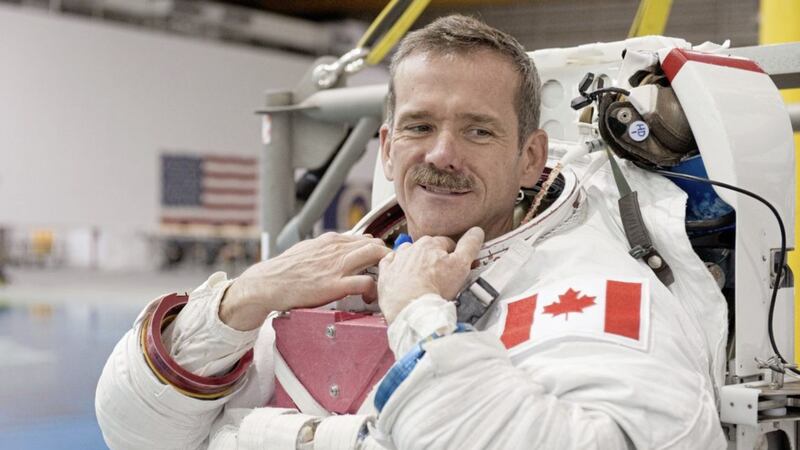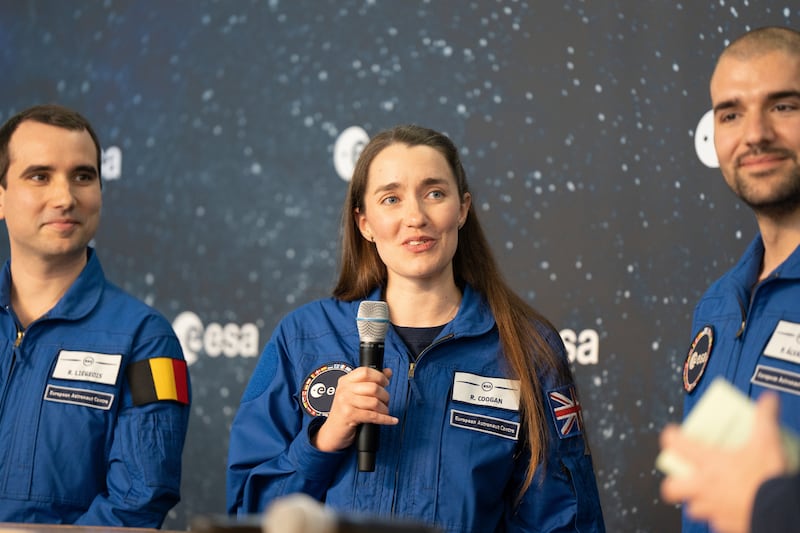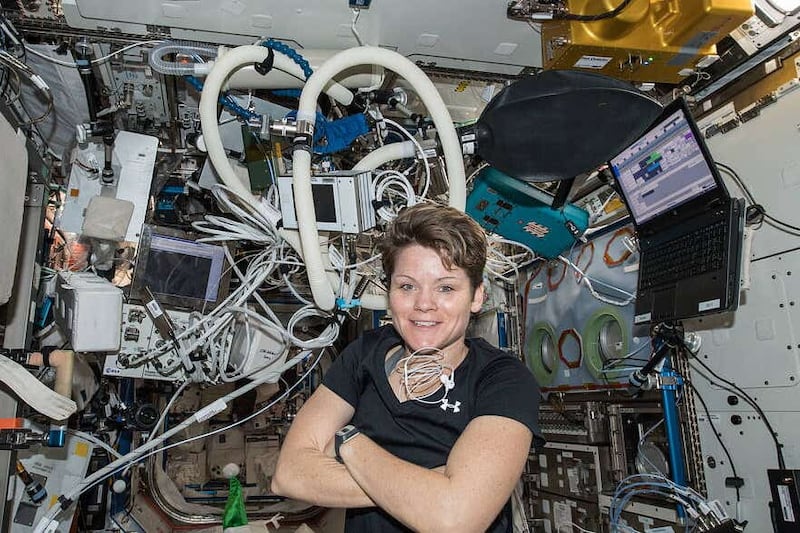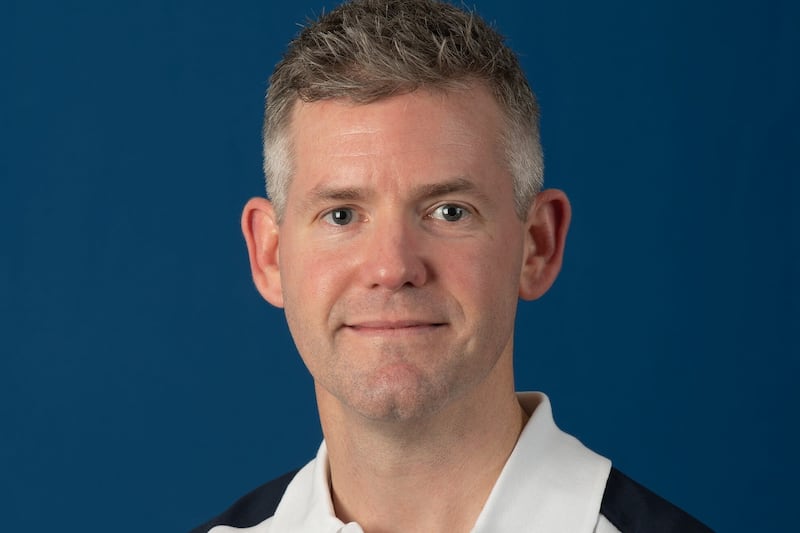"GOOD morning, Earth". That is how Colonel Chris Hadfield –writing on Twitter – woke up the world every day while living for five months aboard the International Space Station.
After 21 years as an astronaut, three spaceflights and 2,600 orbits of Earth, Hadfield became a worldwide sensation, harnessing the power of social media to make outer space accessible to millions.
Hadfield continues to bring us the marvels of science and space travel and the lessons he's learnt from his voyages into space through his books, television appearances and inspirational stage talks.
Next week, he touches down in Belfast's SSE Arena, when he will be encouraging audiences to follow their dreams – just like he did as a nine-year-old child watching the Apollo 11 Moon landing on television.
"When I choose to be an astronaut, it wasn’t difficult – it was impossible," says the 58-year-old, who was raised on a southern Ontario corn farm.
"There were no Canadian astronauts. There was no Canadian Space Agency. There was no path that existed to take me to where I wanted to go. But impossible things can happen as a result of a lot of focus, determination and work."
His first step towards this dream was obtaining his glider pilot licence as a cadet. He then joined the Canadian Armed Forces and earned an engineering degree and went on to work as a test pilot and fighter pilot.
He also informs me he used to be a downhill ski racer and coach – another skill useful for his future career as an astronaut.
"I wasn’t Olympic level, but I competed and I taught skiing for about 10 years. It was actually an excellent way to learn about balance, control and momentum."
In 1992, he was accepted into the Canadian astronaut program, and first flew in space in 1995, visiting the Russian space station Mir.
A second flight on the US space shuttle followed in 2001 before spending five months as commander of the International Space Shuttle in 2012. There, he was responsible for a crew of five astronauts and helped run 200 scientific experiments ranging from human physiology to the impact of low gravity and studies on the Earth's atmosphere.
When I ask Hadfield to name the most significant finding from that research, he refuses. "I’ve flown in space almost as much as anyone in history and I'm immensely proud of all 21 years of my work inventing and enabling space flight and this huge orbiting laboratory that is the space station."
However, upon reflection Hadfield believes that the international collaboration to build and maintain the international space station is the greatest achievement of all.
"The station is the brightest thing in the sky after the sun and the moon, and we built that collectively as a species. Fifteen countries in the world, many whom are regularly in conflict on the surface, including Russia, USA, Japan, Germany and the UK, continue to co-operate at an extremely high, complex and mutually trusting level, every single day.
"Every kid in the world, can walk out at dawn or dusk and watch is go over as a shining example of what we can do together when we do things right.
"It's proof some things superseded transient politics and border struggles."
In 2013, whilst orbiting Earth, Hadfield recorded a cover of David Bowie's hit, Space Oddity, which became a YouTube sensation. But contrary to the song's lyrics, Hadfield argues that living in space is far from lonely.
"In some of the early songs like Rocket Man and Space Oddity, Elton John and David Bowie used space flight as a metaphor for loneliness.
"But a space flight isn’t lonely at all. You see the entire world and it's seven and a half billion people everyday. You are up there with a bunch of other people and are as busy as a human being can be.
“Loneliness is not a proximity problem, it’s a psychological condition. The loneliest people I’ve ever met live in the middle of cities and he best way to combat that is to be actively engaged in the pursuit of things that are important to you.
“We don’t have music to combat loneliness – we have music to celebrate life and that’s why the NASA psychiatrist put the guitar up on the space station 17 years ago and it gets played almost every day," adds Hadfield, who in 2015 released his own musical album, Space Sessions: Songs From A Tin Can.
Whilst NASA provide the astronauts with nutritious dishes, suitable for zero gravity eating, Hadfield admits he certainly didn't travel to space for the culinary experience.
"Your palette is diminished because of weightlessness. The fluid shifts to your head as there is no gravity to drain your sinuses, so it’s like having a bad head cold and thus your food tastes rather bland.
"I preferred spicy food and therefore my favourite was dehydrated shrimp cocktail, because there was a horseradish sauce in it."
Indeed, spending almost half a year in space took it's toll on his body: "On my third flight my body was completely adapted to weightlessness, so my balance, blood pressure regulation, cardiovascular system and bone density had to be re-adapted back to gravity, which took about a year and a half.
Now enjoying his 'retirement', Hadfield feels a responsibility to share what he has learned from his experiences as an astronaut to helps others success in life – whether it be to conquer fear, motivate them to succeed or to improve mental health wellbeing.
"When you've had an immensely rare human experience as I have it would be a shame to squander that and not let people see the ideas behind it and give them the opportunity to incorporate it into their own lives," says Hadfield, who challenges people to achieve their dreams through a three-point action plan.
"The most important factor is remembering you just get one body and you need to take care of it nutritionally and physically
"Secondly, have a plan to improve your skills and get new ones. With the internet education has never been easier and whenever anyone offers to teach you something, whether it's five words of their language or how a tool works – never say no.
"Thirdly, learn how to make decisions and stick with them. Decision making is a skill you can learn and it's absolutely fundamental if you want to shape who you are dreaming of becoming.
"Start small by saying everyday this month I'm going to do 15 sit-ups or learn five new Japanese words and if you stick with it by the end of the month you will inevitably have changed who you are.
"Those three things were really vital in me becoming an astronaut, but I think they are useful no matter what it is you are dreaming of."
:: An Evening With Colonel Chris Hadfield takes place on February 15 at Belfast's SSE Arena as part of The Northern Ireland Science Festival. For festival programme and tickets visit NIsciencefestival.com.








